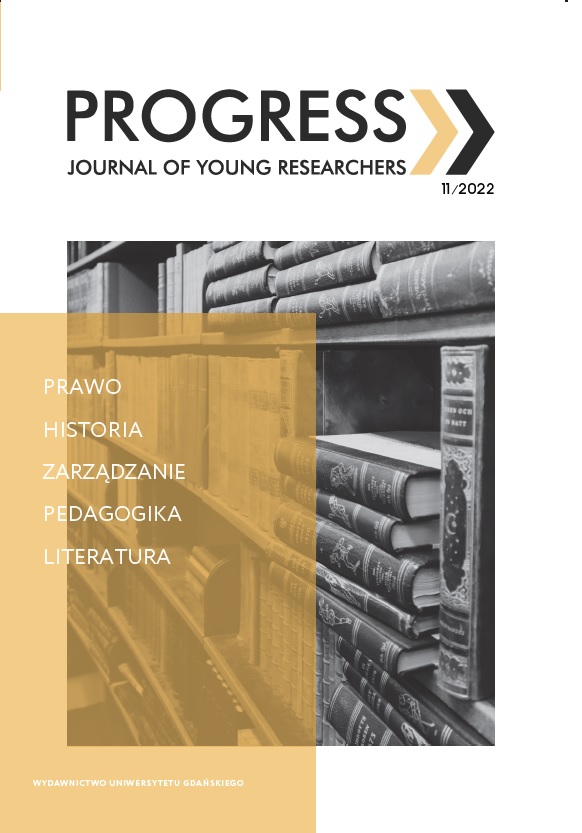The contemporary labour market versus remote work – challenges for organisational culture
DOI:
https://doi.org/10.26881/prog.2022.11.04Keywords:
organizational culture, remote work, labour marketAbstract
The COVID-19 pandemic reminded us of the great potential that lies in remote working. An employee can work from anywhere, saving time commuting to the company’s headquarters in the first place and can adjust activities to their daily rhythm and ways of working without the direct supervision of their supervisor. Unfortunately, home office mode also poses a considerable challenge to the creation of organizational culture in the company – it is more difficult for a remote worker to understand, learn and even feel the specific microclimate of the company. This article aims to present the leading solutions that will help shape the organizational culture in a company offering remote working. The article tries to answer the question of how to build and maintain organizational culture while working remotely. In addition, a survey of the current labour market was conducted to see if remote work is indeed beginning to dominate. Surveys also show how large the scale of this issue is and how the pandemic is shaping the work model. A study of analysis and synthesis of literature sources and the logical inference was used to conduct the analysis
Downloads
References
Aniszewska G., 2007, Kultura organizacyjna – istota zjawiska, w: Kultura organizacyjna w zarządzaniu, red. G. Aniszewska, Warszawa.
Bąk E., 2006, Elastyczne formy zatrudnienia, Warszawa.
Deloitte, 2020, Raport: The voice of the European workforce 2020, https://www2.deloitte.com/pl/pl/pages/human-capital/articles/raport-The-voice-of-the-European-workforce-2020.html, dostęp: 6.04.2022.
Dolot A., 2020, Wpływ pandemii COVID-19 na pracę zdalną – perspektywa pracownika, „E-mentor”, nr 1(83).
Czerska M., 2003, Zmiana kulturowa w organizacji. Wyzwanie dla współczesnego menedżera, Warszawa.
Fravil K., 2021, Building Culture Virtually – sustaining company culture in a post-COVID world, https://www.mercer.com/our-thinking/career/voice-on-talent/building-culture-virtually-sustaining-company-culture-in-a-post-covid-world.html, dostęp: 12.09.2021.
Główny Urząd Statystyczny, 2020, Wpływ Pandemii na wybrane elementy rynku pracy w Polsce w IV kwartale 2020 r., https://stat.gov.pl/obszary-tematyczne/rynek-pracy/popyt-na-prace/wplyw-epidemii-covid-19-na-wybrane-elementy-rynku-pracy-w-polsce-w-czwartym-kwartale-2020-r-,4,4.html, dostęp: 6.04.2022.
Hofstede G., Minkov M., 2010, Cultures and organizations. Software of the mind. Intercultural cooperation and its importance, New York.
Howard-Grenville J., 2020, How to sustain your organization’s culture when everyone is remote, „MIT Sloan Management Review: MIT’S Journal of Management Research and Ideas”, Vol. 63, No. 1.
Inglot K., Praca zdalna już nie benefit, jeszcze nie codzienność, w: Pracodawcy Rzeczypospolitej Polskiej, Praca zdalna 2.0. Rozwiązanie na czas pademii czy trwała zmiana?, https://pracodawcyrp.pl/upload/files/2021/03/praca-zdalna-2-0-rekomendacje-i-ekspertyzy.pdf, dostęp: 6.04.2022.
Jeran A., 2016, Praca zdalna jako źródło problemów realizacji funkcji pracy. „Opuscula Sociologica”, nr 2(16).
Kłopotek M., 2017, The advantages and disadvantages od remote working from the perspective of young employees, „Scientific Quarterly Organization and Management”, Vol. 4, No. 40.
Kostera M., Kownacki S., 1995, Kierowanie zachowaniami organizacyjnymi, w: Zarządzanie. Teoria i praktyka, red. A.K. Koźmiński, W. Piotrowski, Warszawa.
Nilles J.M., 2003, Telepraca. Strategie kierowania wirtualną załogą, Warszawa.
Moliński D., 2021, Jest raport vs pracy zdalnej. W 2020 roku w ten sposób pracowało tylko 9 proc. Polaków, https://next.gazeta.pl/next/7,151003,27206135,praca-zdalna-9-proc-polakow-pracowalo-z-domu-w-2020-r-to.html, dostęp: 12.09.2021.
Ustawa z dnia 2 marca 2020 roku o szczególnych rozwiązaniach związanych z zapobieganiem, przeciwdziałaniem i zwalczaniem COVID-19, innych chorób zakaźnych oraz wywołanych nimi sytuacji kryzysowych (t.j. Dz. U. z 2021 r., poz. 2095).
Schein E., 2004, Organizational culture and leadership, Hoboken.
Spicer A., 2020, Organizational Culture and COVID-19, „Journal of Management Studies”, Vol. 57, No. 8.
Downloads
Published
How to Cite
Issue
Section
License
Copyright (c) 2022 Author(s)

This work is licensed under a Creative Commons Attribution 4.0 International License.

 Academic Scientific Journals
Academic Scientific Journals




